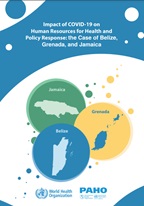About us
Health systems can only function with health workers; improving health service coverage and realizing the right to the enjoyment of the highest attainable standard of health is dependent on their availability, accessibility, acceptability and quality.
WHO estimates a projected shortfall of 11.1 million health workers by 2030 (1), mostly in low- and lower-middle income countries. However, countries at all levels of socioeconomic development face, to varying degrees, difficulties in the education, employment, deployment, retention, and performance of their workforce.
The chronic under-investment in education and training of health workers in some countries and the mismatch between education and employment strategies in relation to health systems and population needs are contributing to continuous shortages. These are compounded by difficulties in deploying health workers to rural, remote and under-served areas. Moreover, the increasing international migration of health workers may exacerbate health workforce shortfalls, particularly in low- and lower-middle income countries.
In some countries, challenges in universal access to health workers may also result from the lack of fiscal space to absorb the supply of health workers. As a result, some countries face the paradox of health worker unemployment co-existing with major unmet health workforce needs.
The High-Level Commission on Health Employment and Economic Growth found that investments in the health and social workforce can spur inclusive economic growth. The health workforce has also a vital role in building the resilience of communities and health systems and in emergency preparedness and response. Approximately 67% of the health workforce are women: investing in the health workforce is an opportunity to create decent employment opportunities, in particular for women and youth.
Our Team
All->Our work
News
External publications

Health policy and system support to optimise community health worker programmes: an abridged WHO guideline
Optimising community health worker (CHW) programmes requires evidence-based policies on their education, deployment, and management. This guideline aims...
Events
Call for consultation
Normative publications

Impact of COVID-19 on Human Resources for Health and Policy Response: the Case of Belize, Grenada, and...
Health workers are crucial in the preparedness and response to COVID-19, but the pandemic has evidenced the shortage of human resources for health (HRH)...

The gender pay gap in the health and care sector a global analysis in the time of COVID-19
The health sector, with its high potential for decent jobs growth, and with 67% of wage employees being women, has a key role to play in women’s...

In 2021, Working for Health operated in 12 countries and provided support to two regional economic areas – the Southern African Development Community...

Achieving and sustaining progress towards global health goals such as universal health coverage and health security requires a health and care workforce...
Additional publications
Analysis of the commitments made by national governments of 57 countries at the Third Global Forum on human resources for health
Leadership and Governance for Enhanced HRH Contributions to Health Systems Strengthening
Realizing universal health coverage for maternal health services in the Republic of Guinea: the use of workforce projections to design health labor market interventions
A Universal Truth: No Health Without A Workforce
Health Workforce 2030: Global strategy on human resources for health brochure
The Recife Political Declaration on Human Resources for Health: Renewed commitments towards universal health coverage
Health topics
Related teams

